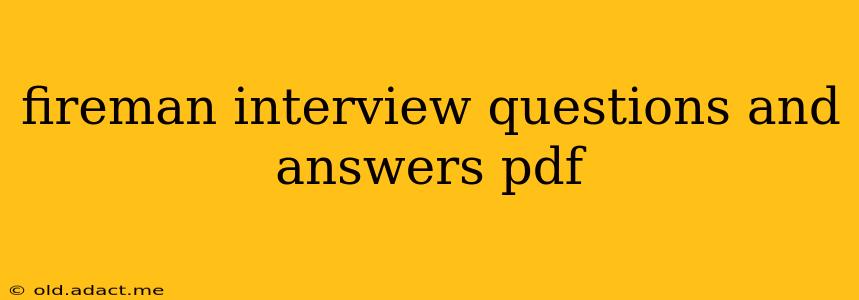Ace the Firefighter Interview: Questions and Answers to Boost Your Chances
Becoming a firefighter is a challenging yet rewarding career path. The interview process is crucial, acting as a gatekeeper to this exciting profession. This guide delves into common firefighter interview questions and provides insightful answers, helping you prepare and present yourself confidently. Remember, this isn't just about memorizing answers; it's about showcasing your personality, skills, and commitment to serving your community.
Why Choose a Career in Firefighting?
Many aspiring firefighters are driven by a deep-seated desire to help others. The job is far more than putting out fires; it encompasses rescue operations, medical emergencies, and community outreach. Your answer should reflect your understanding of this multifaceted role and demonstrate your genuine passion for public service.
Here’s a strong answer example: "I've always been drawn to helping people in need. The idea of being on the front lines, responding to emergencies and making a tangible difference in people's lives, is incredibly motivating. Firefighting isn't just about fighting fires; it's about being a critical first responder, providing medical assistance, and contributing to community safety. The challenges and camaraderie of the job appeal to me greatly."
Common Firefighter Interview Questions and Answers:
Here, we'll tackle some frequently asked questions, along with strategies to craft compelling answers.
1. Tell me about yourself.
This seemingly simple question is your opportunity to set the tone. Highlight relevant experience, skills, and personal qualities. Keep it concise, focused, and engaging.
- Strong Answer Example: "I'm a highly motivated individual with a strong background in [mention relevant experience, e.g., EMT training, military service, volunteer work]. I possess excellent physical stamina, a quick thinking ability, and a commitment to teamwork. My experience in [mention specific experience] has honed my problem-solving skills and ability to remain calm under pressure. I'm eager to contribute my skills to your team and serve the community."
2. Why are you interested in this specific fire department?
Research is key! Understand the department's mission, values, and community involvement. Show your genuine interest and align your skills with their needs.
- Strong Answer Example: "I've been impressed by [Fire Department's Name]'s commitment to community outreach programs, particularly [mention a specific program]. Your department's reputation for excellence and innovative approach to firefighting aligns perfectly with my professional goals. I'm excited about the opportunity to contribute to a team with such a strong track record."
3. Describe a time you worked as part of a team to achieve a goal.
Focus on teamwork, communication, problem-solving, and your contribution to the team's success. Use the STAR method (Situation, Task, Action, Result).
- Strong Answer Example: "During my time as a volunteer [mention your role], our team faced a challenging [describe the situation]. Our task was to [explain the task]. I took the initiative to [describe your action], which ultimately contributed to [describe the positive result]. This experience reinforced the importance of clear communication and collaborative problem-solving in achieving common goals."
4. How do you handle stress and pressure?
Demonstrate your ability to manage high-stress situations. Highlight coping mechanisms and stress-reducing techniques.
- Strong Answer Example: "I understand that firefighting is a high-pressure job, but I thrive in challenging environments. I use techniques such as [mention techniques, e.g., mindfulness, exercise, proper sleep] to manage stress effectively. I also find that maintaining open communication with my team helps alleviate pressure and fosters a supportive environment."
5. Describe a time you failed and what you learned from it.
This question assesses self-awareness and growth. Be honest, reflective, and focus on the lessons learned.
- Strong Answer Example: "In a previous role, I misjudged a situation and the result wasn't ideal. Instead of dwelling on the mistake, I took the time to analyze what went wrong, identifying [mention specific mistakes]. I learned the importance of [mention lesson learned, e.g., better communication, more detailed planning], and I now actively incorporate these lessons into my approach."
6. What are your strengths and weaknesses?
Be honest, but frame your weaknesses as areas for growth.
- Strong Answer Example: "One of my greatest strengths is my ability to remain calm and focused under pressure. I'm also a quick learner and highly adaptable. An area I'm working on is delegation; I sometimes tend to take on too much responsibility. I'm actively addressing this by learning to trust my teammates and delegate effectively."
7. How would you handle a conflict with a coworker?
Demonstrate your ability to resolve conflicts constructively.
- Strong Answer Example: "I believe in open and honest communication. If a conflict arises, I would first attempt to address the issue directly with my coworker, focusing on finding a solution that works for both of us. If necessary, I would involve a supervisor to mediate and ensure a fair resolution."
8. Do you have any questions for us?
Always have prepared questions. This shows your genuine interest and initiative. Ask about training programs, community involvement, or departmental challenges.
Remember to dress professionally, arrive on time, and maintain good eye contact throughout the interview. Practice your answers beforehand, but allow for natural conversation. By showcasing your skills, experience, and commitment, you'll greatly increase your chances of success in your firefighter interview. Good luck!
